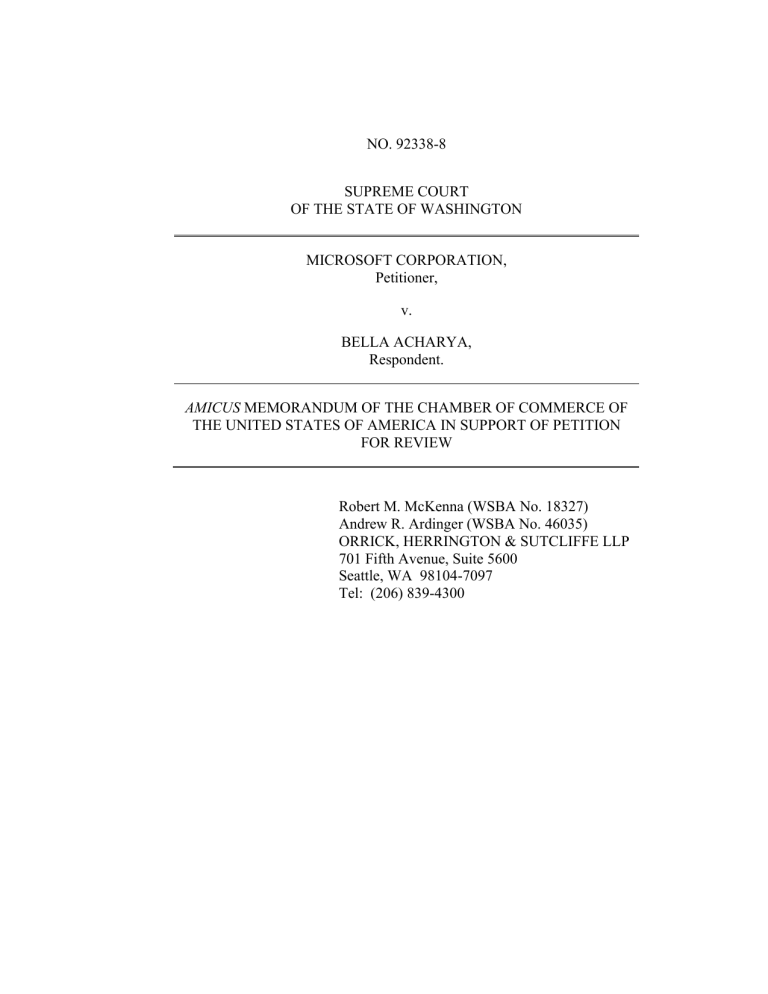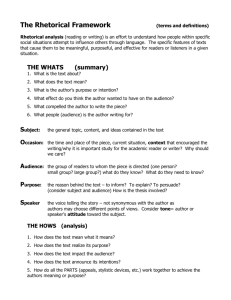Microsoft v. Acharya (Supreme Court of Washington)..

NO. 92338-8
SUPREME COURT
OF THE STATE OF WASHINGTON
MICROSOFT CORPORATION,
Petitioner, v.
BELLA ACHARYA,
Respondent.
AMICUS MEMORANDUM OF THE CHAMBER OF COMMERCE OF
THE UNITED STATES OF AMERICA IN SUPPORT OF PETITION
FOR REVIEW
Robert M. McKenna (WSBA No. 18327)
Andrew R. Ardinger (WSBA No. 46035)
ORRICK, HERRINGTON & SUTCLIFFE LLP
701 Fifth Avenue, Suite 5600
Seattle, WA 98104-7097
Tel: (206) 839-4300
TABLE OF CONTENTS
Page
I.
II.
IDENTITY AND INTEREST OF AMICUS CURIAE .................. 1
STATEMENT OF CASE .............................................................. 2
III.
ARGUMENT WHY REVIEW SHOULD BE GRANTED .......... 4
A.
The Court of Appeals Improperly Accepted
Respondent’s Allegations as True When Reviewing the Forum Selection Clause ............................................... 5
B.
The Court of Appeals’ Novel “Equal Footing”
Standard Is Impractical and Undefined.............................. 7
IV.
CONCLUSION............................................................................ 10
-i-
TABLE OF AUTHORITIES
Page(s)
CASES
Acharya v. Microsoft Corp.
,
189 Wn. App. 243, 354 P.3d 908 (2015) .......................... 1, 2, 5, 6, 8, 9
Atl. Marine Constr. Co., Inc. v. United States District Court for the W. Dist. of Tex.
, ___ U.S. ___,
134 S. Ct. 568 (2013).................................................................... 4, 8, 9
Carnival Cruise Lines, Inc. v. Shute ,
499 U.S. 585 (1991)........................................................................ 9, 10
Dix v. ICT Grp., Inc.
,
160 Wn.2d 826, 161 P.3d 1016 (2007)................................... 5, 6, 9, 10
Stewart Org., Inc. v. Ricoh Corp.
,
487 U.S. 22 (1988)................................................................................ 8
Tyner v. Dep’t of Soc. & Health Servs.
,
92 Wn. App. 504, 963 P.2d 215 (1998), rev’d on other grounds , 141 Wn.2d 68, 1 P.3d 1148 (2000).................................... 5, 6
Voicelink Data Servs. v. Datapulse, Inc.
,
86 Wn. App. 613, 937 P.2d 1158 (1997) .................................... 5, 6, 10
RULES
RAP 13.4(b)(1) ........................................................................................... 5
RAP 13.4(b)(2) ........................................................................................... 5
RAP 13.4(b)(4) ........................................................................................... 5
-ii-
TABLE OF AUTHORITIES
(continued)
Page(s)
OTHER AUTHORITIES
Exports , Wash. State Dep’t of Commerce, http://www.commerce.wa.gov/Economic-
Development/Exports/Pages/default.aspx (last visited
Nov. 6, 2015) ........................................................................................ 3
Florida Passes New York to Become the Nation’s Third
Most Populous State, Census Bureau Reports , Census
Bureau, CB14-232 (Dec. 23, 2014), available at http://www.census.gov/newsroom/pressreleases/2014/cb14-232.html ................................................................ 3
Wash. Council on Int’l Trade & Trade Dev. Alliance of
Greater Seattle, An International Competiveness
Strategy for Washington State (2012), available at http://wcit.org/wpcontent/uploads/2014/11/InternationalCompetitiveness
Strategy Final_resized.pdf .................................................................... 3
Washington’s Population Tops 7 Million , Wash. St. Office of Fin. Mgmt. (June 25, 2015), available at http://www.ofm.wa.gov/pop/april1/ofm_april1_press_ release.pdf ............................................................................................. 4
-iii-
I.
IDENTITY AND INTEREST OF AMICUS CURIAE
Amicus curiae the Chamber of Commerce of the United States of
America (the “Chamber”) is the world’s largest business federation. It represents 300,000 direct members and the interests of more than three million companies and professional organizations of every size, in every industry sector, and from every region of the country, including
Washington. The Chamber opposes the decision by the Court of Appeals in this case, 189 Wn. App. 243, 354 P.3d 908 (2015), in which the Court disregarded Washington’s well-established test for assessing forum selection clauses and instead undertook a judicial “renegotiation” of the contract at issue. If its decision is allowed to stand, it will likely harm employers, employees, companies, and consumers by undermining clear contractual language and injecting uncertainty into all manner of business relationships, including employment contracts. The high costs of this uncertainty will be felt throughout the economy, since parties negotiate forum selection clauses so that they can manage the risk and limit the expense of potential litigation. If parties are unable to rely upon their contracts, the additional costs they incur will necessarily be absorbed throughout the system: transactions will become more expensive to complete; there will be less money available to pay employee salaries and benefits; and the prices of consumer products will increase. Though the
-1-
Court of Appeals decision will undermine all kinds of businesses, the
Chamber is especially concerned about the impact that this case may have on the ability of American companies to do business overseas—and especially the impact for Washington, for whose economy international trade is so central. The Chamber is interested in ensuring that this Court grant the Petition for Review to restore certainty that forum selection clauses in contracts will be honored in Washington.
II.
STATEMENT OF CASE
The Chamber refers to Petitioner’s and Respondent’s statements of the case, and the Court of Appeals decision’s discussion of the facts.
It is worth emphasizing that this case, although specifically an employment dispute, implicates broad issues concerning international trade, which is crucially important for Washington. Respondent sought creation of a new position on an international team, something her employer was willing to accommodate. See 189 Wn. App. at 246-47;
Petition for Review at 2-3. In order for this opportunity to work, she needed to resign from Petitioner and join a foreign subsidiary. See 189
Wn. App. at 247. In this regard, Petitioner is like many other transnational (and even trans-state) enterprises: companies that do business across borders frequently must rely on a subsidiary structure for legal, regulatory, administrative, and commercial reasons. And such companies
-2-
must have faith that, as they move products and perform services across the globe, they will be able to structure their business contracts, so as to select in advance where any disputes that arise will be resolved.
Washington’s economy, in particular, relies on international trade.
According to the State Department of Commerce, “Washington state is the most trade dependent state” in the country.
1 The Department notes that
“exports account[] for more than 30% of new jobs created in the state over the past 30 years.” 2 Recent research by the Washington Council on
International Trade and the Trade Development Alliance of Greater
Seattle found that “at least 40% of all jobs” in Washington are tied to international trade.
3 Washington’s per capita rate of exports of merchandise and commodities is more than double the average state’s output.
4 It also exports the fifth highest total value of services, behind only California, New York, Texas, and Florida—the four most populous states, each with a population several times the size of Washington’s.
5
1 Exports , Wash. State Dep’t of Commerce, http://www.commerce.wa.gov/Economic-
Development/Exports/Pages/default.aspx (last visited Nov. 6, 2015).
2 Id.
3 See Wash. Council on Int’l Trade & Trade Dev. Alliance of Greater Seattle, An
International Competiveness Strategy for Washington State , at 1, 16 (2012), available at http://wcit.org/wp-content/uploads/2014/11/InternationalCompetitivenessStrategy
Final_resized.pdf (last visited Nov. 6, 2015).
4
See id.
at 3 (Washington exports $9,462 per capita compared to an average of $4,041).
5
Id.
at 6; see, e.g.
, Florida Passes New York to Become the Nation’s Third Most
Populous State, Census Bureau Reports , Census Bureau, CB14-232 (Dec. 23, 2014),
-3-
Washington’s economy and its workers’ livelihoods depend on
Washington remaining a hub of international commerce. To manage these complex enterprises in an efficient manner, compliant with business exigencies and regulatory requirements, Washington’s businesses that depend on foreign subsidiaries need to be able to count on the enforceability of the contracts they negotiate, including forum selection clauses that designate foreign courts to resolve disputes involving the employees of their subsidiaries who live and work overseas.
III.
ARGUMENT WHY REVIEW SHOULD BE GRANTED
The Court of Appeals decision misapplied well-established
Washington law concerning the treatment of allegations when analyzing a forum selection clause. Further, the decision created a novel, vague, and potentially limitless “equal footing” analysis, explicitly refusing to adopt the United States Supreme Court’s approach as recently articulated in
Atlantic Marine Construction Company, Inc. v. United States District
Court for the Western District of Texas , ___ U.S. ___, 134 S. Ct. 568
(2013). Because the Court of Appeals decision is at odds with this Court’s decisions (and prior decisions of the Court of Appeals itself), and because the decision could significantly impact the substantial interest the public available at http://www.census.gov/newsroom/press-releases/2014/cb14-232.html;
Washington’s Population Tops 7 Million , Wash. St. Office of Fin. Mgmt. (June 25,
2015), available at http://www.ofm.wa.gov/pop/april1/ofm_april1_press_release.pdf.
-4-
has in Washington’s economy by increasing contractual uncertainty, the
Chamber urges the Court to accept review. See RAP 13.4(b)(1), (2) & (4).
A.
The Court of Appeals Improperly Accepted
Respondent’s Allegations as True When Reviewing the
Forum Selection Clause
This Court should grant review to correct the appellate court’s mistaken presumption that on a motion to dismiss based on a forum selection clause, the nonmoving party’s allegations, and the inferences drawn from those allegations, “must be accepted as true.” See 189 Wn.
App. at 250-51.
6
This Court has instructed that “[f]orum selection clauses are prima facie valid.” Dix v. ICT Grp., Inc.
, 160 Wn.2d 826, 834, 161 P.3d 1016
(2007). Washington courts have determined that forum selection clauses should be enforced, as they “serve[] the salutary purpose of enhancing contractual predictability.” Voicelink Data Servs. v. Datapulse, Inc.
, 86
Wn. App. 613, 617, 937 P.2d 1158 (1997). A party resisting a forum selection clause bears a “heavy burden” of proof to show that enforcement
6 The Court of Appeals decision cited Tyner v. Dep’t of Soc. & Health Servs.
, 92 Wn.
App. 504, 514, 963 P.2d 215 (1998), rev’d on other grounds , 141 Wn.2d 68, 1 P.3d 1148
(2000), but actually appears to have even broadened Tyner ’s scope. In that case, it appears that the defendant asserted its motion to dismiss “at the end of the case” after trial. Tyner , 92 Wn. App. at 514. Accordingly, the Court of Appeals stated that “the nonmoving party’s evidence , together with all reasonable inferences that may be drawn therefrom, must be accepted as true.” Id.
(emphasis added). Although the Acharya Court quoted Tyner ’s reference to evidence, it credited Acharya’s assertions that Microsoft was her employer and the inferences that flow from there, not, as Tyner prescribes, any evidence .
See Acharya , 189 Wn. App. at 249, 251.
-5-
of the clause is unreasonable. Id.
at 618-19; Dix , 160 Wn.2d at 834-35
(collecting cases). As a result, “[i]n assessing a forum selection clause for enforceability, the court does not accept the pleadings as true.” Dix , 160
Wn.2d at 835.
Unfortunately, the erroneous application of the wrong standard by the Court of Appeals determined the outcome of the appeal. By reversing the presumptions and burdens, the Court of Appeals fully credited
Respondent’s allegations that she was a Washington plaintiff, employed by a Washington company—and dismissed Petitioner’s evidence that
Respondent’s claims concerned an employee of a European company and events that occurred while she was working in Europe. See Acharya , 189
Wn. App. at 255 (citing Tyner and stating that “for purposes of the motion under review, we presume that [Petitioner], a Washington corporation, was [Respondent]’s employer at the time of the alleged wrongful conduct”) (emphasis added). The Court’s application of the wrong standard carried through the rest of its analysis. See id.
(decision to credit assertion that Petitioner, and not foreign affiliate, employed Respondent, and other allegations, was “backdrop” for refusal to enforce contract).
The Chamber is very concerned that the misapplication of the standard from Tyner , instead of Dix (and the related case law), in this new, published Court of Appeals decision will throw into doubt Washington’s
-6-
law. Parties to a contract will not know how to value a forum selection clause in the course of negotiations, since a “heavy burden” could either weigh in favor of or against enforcement, depending on which body of law the trial judge decides to apply. Moreover, if Washington courts start to abandon Dix and follow Acharya , an artfully pled complaint could require a party to come to Washington to litigate over conduct that took place anywhere in the world—even if the parties had previously agreed to litigate their disputes elsewhere.
In addition, the Chamber is concerned about what this may mean for existing contracts. Enforcement of a contract is a matter of a law, and contracts are written with the applicable forum and body of law in mind.
Parties may find that the rights they believed they possessed at the time of negotiation have been substantively transformed at the time of litigation, by nothing more than their counterparty’s pleadings. Such changes are equally likely to affect all parties, big or small, corporate or individual, depending on what differences in protections, rights and duties exist between Washington and the forum for which the contract was negotiated.
B.
The Court of Appeals’ Novel “Equal Footing” Standard
Is Impractical and Undefined
The Court of Appeals declined to adopt the approach to analyzing forum selection clauses set forth by the U.S. Supreme Court in Atlantic
-7-
Marine . In Atlantic Marine , the Court held that “a valid forum-selection clause [should be] given controlling weight in all but the most exceptional cases.” 134 S. Ct. at 581-82 (quoting Stewart Org., Inc. v. Ricoh Corp.
,
487 U.S. 22, 33 (1988) (Kennedy, J., concurring)). The Acharya Court characterized the Atlantic Marine approach as analyzing enforcement of forum selection clauses under a forum non conveniens analysis in which, due to the prior agreement of the parties, the private factors were presumed to weigh in favor of enforcement. 189 Wn. App. at 251-52.
Washington’s test, by contrast, considers whether enforcement of the clause is “unreasonable” under the circumstances. Id.
at 253. Noting that this Court has not yet considered whether Washington would adopt
Atlantic Marine , the Court of Appeals declined to do so. Id.
at 254.
Specifically, the Court declined to do so “on these facts.” Id.
It assumed, without explaining why, that the parties to the contract in
Atlantic Marine , a government contractor and one of its subcontractors
( see 134 S. Ct. at 575), were “on equal footing.” 189 Wn. App. at 253.
As a result (and possibly simply because both parties were corporations), the Court presumed that “their contract [was] the product of thoughtful, purposeful bargaining that should not be open to renegotiation,” but
“[t]hat is not the case here.” Id.
The Court found that the “clear
-8-
hierarchy” in an employer-employee relationship warranted a presumption that the parties could not negotiate an “arm’s length” deal. Id.
at 253-54.
The Acharya analysis is disturbing for many reasons, and the
Chamber urges this Court to grant the Petition for Review to address these issues. First, if left in place, opportunistic plaintiffs will rely on Acharya to suggest that a contract can never be presumed to be reached at arm’s length if there is a “hierarchy” (setting aside the irony that the Atlantic
Marine corporations were in a contractor-subcontractor hierarchy with one another). Second, it misinterprets Atlantic Marine . According to the U.S.
Supreme Court, any plaintiff that “agrees by contract to bring suit only in a specified forum” does so “presumably in exchange for other binding promises.” 134 S. Ct. at 582. Third, it runs against this Court’s prior enforcement of forum selection clauses, even where a party has alleged an imbalance in negotiations—or no negotiations. See Dix , 160 Wn.2d at 834
(“In general, a forum selection clause may be enforced even if it is in a standard form consumer contract not subject to negotiation”) (citing
Carnival Cruise Lines, Inc. v. Shute , 499 U.S. 585, 589-95 (1991)).
The apparent approval by the Court of Appeals of judicial
“renegotiation” of settled contracts where a court—sitting many years after the contract was negotiated and performed or partially performed— perceives a lack of “equal footing,” would, if permitted to stand, establish
-9-
an unprecedented, impractical, and vague standard that needlessly injects significant uncertainty into contractual relations—and diminishes the value provided by the forum selection clauses that this Court and the Court of Appeals have recognized. See, e.g.
, Dix , 160 Wash 2d. at 834 (citing
Voicelink , 186 Wn. App. at 617, for the proposition that forum selection clauses enhance “contractual predictability” and stating that “such clauses may reduce the costs of doing business, thus resulting in reduced prices to consumers,” citing Carnival Cruise , 499 U.S. at 594). This Court should grant the Petition for Review, clarify that the “equal footing” analysis has no place in Washington jurisprudence with regard to forum selection clauses, and consider adoption of Atlantic Marine .
IV.
CONCLUSION
For the foregoing reasons, the Chamber respectfully requests that the
Court grant the Petition for Review.
DATED this 10th day of November, 2015.
Respectfully submitted,
ORRICK, HERRINGTON & SUTCLIFFE LLP
By:
Robert M. McKenna (WSBA No. 18327)
Andrew R. Ardinger (WSBA No. 46035)
Attorneys for the Chamber of Commerce of the
United States of America
-10-
DECLARATION OF SERVICE
On November 10, 2015, 1 caused to be served a true and correct copy of the foregoing document upon counsel of record, at the addresses stated below, via the method of service indicated:
James Sanders
Eric D. Miller
Tobias S. Pieñng
Perkins Coie LLP
1201 Third Ave., Suite 4900
Seattle, WA 98101 jsandersperkinscoie.com
emiller@perkinscoie.com
tpieringperkinscoie.com
Attorneys for Petitioner
Avi J. Lipman
Jerry R. McNaul
Curtis C. Isacke
McNaul Ebel Nawrot & Helgren PLLC
One Union Square
600 University St..
77th
Seattle, WA 98101-3143
Fl.
alipman@mcnaul.com
jmcnaul@mcnaul.com
cisackecamcnaul.com
A Itorneys for Respondem
Via US Mail
Via E-Mail
Via US Mail
Via E-Mail
I declare under penalty of perjury under the laws of the United
Stales of America and the State of Washington that the foregoing is true and correct.
DATED this
10th day of November, 2015, at Seattle, Washington.
Leslie Peterson
—11—







